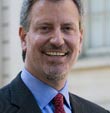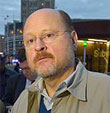★Endorsed Candidate★

Bill de Blasio (D, WF)
Candidate Questionnaire
Age: 52
Occupation: Public Advocate, City of New York
Age: 52
Occupation: Public Advocate, City of New York
Education: New York University (BA); Columbia University (MA)
Campaign Website
Campaign Website
Bill de Blasio is currently the Public Advocate for the City of New York, having been first elected in 2009 with Citizens Union’s support. He previously served in the City Council from 2002 to 2009 and served as Hillary Clinton’s campaign manager in her 2000 race against Rick Lazio. Before that he was Regional Director for the U.S. Department of Housing and Urban Development and an aide to former Mayor David Dinkins.
On reform issues, de Blasio touted his work as Public Advocate in response to the controversial Citizens United decision, in which he organized the largest response ever to a Securities and Exchange Commission (SEC) rule change related to the decision and acted locally to support transparency of campaign spending. De Blasio sees transparency as potentially transformative for government reform, pointing to his public list of landlords who were compelled to fix violations in their buildings as an example of the power of transparency. De Blasio supports boards of elections reform and campaign finance reform at the state level, and will lobby Albany on both of these issues. In addition, he supports ways to increase voter turnout such as early voting and voting by mail. He believes offices that serve as check on a strong mayoralty – the Conflicts of Interest Board, borough presidents, the public advocate and community boards – are deserving of fixed budgets.
De Blasio has separated himself from his major opponent on police issues. He supports reforming the practice of stop, question and frisk in a way similar to the less critical position put forward by Citizens Union, as well as our reform proposals to improve oversight of the police. These include making the Commission to Combat Police Corruption permanent, as well as allowing the Civilian Complaint Review Board to initiate investigations without a formal complaint. De Blasio supports additional reforms to police oversight beyond those examined by Citizens Union, including an inspector general for the New York Police Department as well as expanding access to the courts for racial profiling claims.
Beyond reform, de Blasio’s overarching focus of his campaign is addressing income inequality, from which many of his policies flow. He is a public school parent, with a longstanding Brooklyn affinity. His signature policy is universal pre-kindergarten and expansion of after-school programs in middle school, which would be funded by a 5-year temporary tax of 4.3 percent (up from the current 3.9 percent) for those earning $500,000 or more. On affordable housing, he supports mandating inclusionary zoning. De Blasio supports a more robust version of paid sick leave, as well as a living wage law. On jobs and economic development, he supports the elimination of tax breaks provided to individual business and would use the potential savings on overall economic development and to increase the job skills of workers. While de Blasio backs mayoral control of schools, he also supports greater parental engagement and would require certain charter schools pay rent for the use of school space. He would also continue current Mayor Michael Bloomberg’s health and climate change initiatives.
Citizens Union believes that de Blasio is arguably the most eloquent of the candidates in conveying a vision of what he will tackle as mayor, and has been able to tap effectively into the pulse of the general public in articulating his goals for the office and attracting considerable support. De Blasio has a strong record on reform, and as mayor would be dedicated to a transparent administration that engages all stakeholders and residents in the City. While the issue of income inequality – or possibly better put as affordability or standard of living – needs attention, Citizens Union is concerned over the language he has used to articulate the problem. This language has had the unfortunate consequence of alienating some like-minded citizens in ways that are counterproductive in creating support for tackling a pressing issue, and we urge him to move forward on this issue in a more inclusive manner.
While his management experience is less than that of his major opponent, and he is untested in managing an enterprise on the scale of city government, de Blasio has a coherent sense of how he would run city government. The job of mayor is more than simply managing the delivery of city services; it is about providing a vision that appeals broadly to the need and hopes of New Yorkers. De Blasio possesses some important and appealing leadership qualities that may enable him to rally the city in support of his policies in a way that his opponent has not been able, and make happen the changes he seeks. Given his leadership abilities, compelling vision, and commitment to reform, Citizens Union endorses Bill de Blasio.

Joe Lhota (R, C, T2H, SF)
Candidate Questionnaire
Age: 58
Age: 58
Occupation: Former Chairman, Metropolitan Transit Authority (MTA)
Education: Georgetown University (BS, BA); Harvard University (MBA)
Education: Georgetown University (BS, BA); Harvard University (MBA)
Joe Lhota has extensive public service experience. He most recently was the chairman of the Metropolitan Transit Authority (MTA), and previously served as the Deputy Mayor of Operations and Budget Director under Mayor Rudy Giuliani. Lhota also has experience in municipal finance, including infrastructure project finance, and was an executive for Cablevision and Madison Square Garden.
On reform issues, Lhota supports nonpartisan elections. He believes the boards of elections should be revamped to remove partisanship, but recognizes this requires a change to state law. Lhota supports making the city’s budget more transparent by reforming the presentation of agency spending. He believes term limits should be put in place for state legislators.
Regarding oversight of the police, Lhota supports the implementation of stop, question and frisk in its current form, contrary to Citizens Union’s point of view, and opposes Citizens Union’s proposals to make the Commission to Combat Police Corruption permanent and grant the CCRB the authority to initiate investigations.
Beyond reform issues, Lhota’s top priorities are job creation, education and quality of life issues. Lhota will continue Mayor Bloomberg’s emphasis on diversifying the city’s economy through growing the technology industry. Regarding education, Lhota supports mayoral control and wants to double the number of charter schools. He would replicate educational practices used in other countries that devote many more hours to professional development of teachers. Lhota would utilize evaluations as a tool to improve teacher performance rather than as a disciplinary tool. Another priority of Lhota’s is addressing quality of life issues, which he defines as being inclusive of affordability as well as public safety. He supports mixed development, specifically requiring developers to reserve 20-30 percent of new housing for low and middle-income residents. Lhota also believes that the properties of state authorities and closed post offices should be considered for development. Lhota supports clawback provisions in tax abatements to ensure that affordable housing and other development agreements are honored.
Lhota would focus on the way the mayor’s office communicates with the public, engaging communities more by visiting all the community boards in his first year. He was critical of Mayor Michael Bloomberg’s “siloed” approach in managing agencies, supporting a more centralized approach, and would encourage cross-agency collaboration, stressing follow-up and persistence as the key to accomplishing his agenda.
Citizens Union believes Lhota’s executive experience running the MTA and as Deputy Mayor of Operations makes him a well-qualified candidate for mayor. We admire his management skill in getting the MTA up and running after Hurricane Sandy, which demonstrated a solid capacity for leadership during times of crisis. Lhota supports a number of CU’s reform issues, but does not go as far as his opponent in support of election reform, police issues, and independent budgeting for certain city offices and agencies. His solid support for key reforms, however, and his strong management experience earned him Citizens Union’s preference in the Republican Party primary. His opponent in the general election, though, has a clearer record of and commitment to reform and possesses more appealing leadership qualities, which is why Lhota is not able to earn our final level of support.
The following candidates were not scheduled for an interview by Citizens Union:
Adolfo Carrion Jr. (I)
Randy Credico (TWS)
Michael J. Dilger (Fl)
Daniel Fein (SW)
Michael K. Greys (Fr)
Anthony Gronowicz (G)
Jack Hidary (JE, CS)
Jimmy McMillan (R2H)
Joseph Melaragno (AT)
Carl E. Person (Re)
Erick J. Salgado (SC)
Michael Sanchez (Lt)
Sam Sloan (WV)
